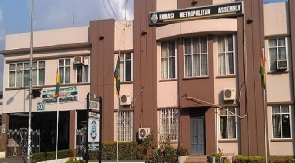- Home - News
- TWI News | TV
- Polls
- Year In Review
- News Archive
- Crime & Punishment
- Politics
- Regional
- Editorial
- Health
- Ghanaians Abroad
- Tabloid
- Africa
- Religion
- Election 2020
- Coronavirus
- News Videos | TV
- Photo Archives
- News Headlines
- Press Release
General News of Thursday, 2 November 2023
Source: kasapafmonline.com
MMDAs raffled as GII demands sanctions for haphazard urban development
The Ghana Integrity Initiative (GII) has called for stiff sanctions for anyone who flouts Ghana’s Land Use and Spatial Planning Act Act 2016 (Act 924); governing the sale, management and administration of lands in the country.
The anti-corruption body has been questioning how developers obtained permits to put up structures in clearly inappropriate spaces including reserves and ecological buffers.
Speaking on the sidelines of a day’s workshop in Kumasi, Programs Manager Michael Okai expressed concern, “people have built in waterways, filled wetlands and constructed big structures in those areas.”
“We have blocked walkways and built structures without proper permits. Meanwhile there are people who have been employed to monitor and inspect these things,” he observed.
Michael Okai indicated that though some spatial Planning Offices in the regional, metropolitan, municipal and district assemblies complain of resource constraints; he was aware corruption and underhand dealings have allowed some unauthorized structures to spring up without inhibition.
“From what people tell me, and from personal engagements, some of them take money and gloss over it and leave. We must begin sanctioning people who are flouting the laws,” he insisted.
Ghana’s Land Use and Spatial Planning Act 2016 (Act 924) provides for the Land Use and Spatial Planning Authority to work with Spatial Planning Committees and Technical Sub Committees in all Assemblies to ensure that land use is deliberately planned, laid out and enforced sustainably.
The workshop in Kumasi organized by the local chapter of Transparency International (T.I.); trained personnel at the assemblies on the tenets of the act; their roles in developing the right plans and approving permits in a transparent and accountable environment, consistent with the Act.
Officers parry blame
Officers in the various Spatial Planning Committees in the Assemblies attributed their inability to monitor and enforce spatial plans to lack of resources and uncooperative traditional leaders.
Speaking to Ultimate News, head of works for the Kwabere East Municipal Assembly, Eric Oppong Agyemang rejected calls for sanctions insisting Building Permit Inspectors were not adequate to be everywhere at all times.
“When a development has been carried out, is it the assembly which allowed it? The person did not come to the assembly and I don’t buy that idea. Is it adequate to go to every developer?” he parried.
Assembly members who form part of the technical committees, would however have none of that. They accused the officers of warming their seats with no care for actual monitoring.
The assembly member for the Tech Traditional Area Evelyn Agyemang called out planning officers for sitting in the comfort of their offices while haphazard developments festered.
“Even when an assembly member goes to complain about a developer, they will not come to the site to inspect the construction. They will rather be seated in their offices,” she contended.
Corruption in Land Administration
Pertinent matters raised by participants of the training included corruption in land sale, administration and management.
Disturbed opinion leaders complained about Corruption related to issuing building permits and injustices suffered by land owners on the back of rezoning and recalling of allocation papers;
Other stakeholders flagged pointless bureaucracy in processing land documents which pushes frustrated clients to pay bribes to get their documents on time.
Acting CEO of the Land Use and Spatial Planning Authority Chapman Owusu Sekyere who facilitated the training stated that several people keep falling prey to these infractions and corrupt practices because they fail to do their due diligence.
“A plot of land is very expensive and if you’ve been able to purchase one, what prevents you from doing due diligence to ensure you acquire a proper plan and get a permit before development,” he queried.
Background:
The day’s workshop funded by the German Federal Ministry of Economic Cooperation and Development (BMZ) was necessitated by Ghana’s fast growing urban population which has swelled to some 17 million representing 58% of the country’s population.
The GII fears without strengthening the functions and capacities of land use and spatial planning structures, Ghana’s urban resources will be overwhelmed with its pervasive effects of overcrowding; traffic congestion; rationing of utilities; overstretched amenities, poverty and crime.
Apart from assembly members and officers from the town, country and spatial planning departments of MMDAs, staff of the lands Department, the Otumfuo Stool lands Secretariat and other stakeholders in related and peripheral institutions were present to respond to issues related to their specific offices.











